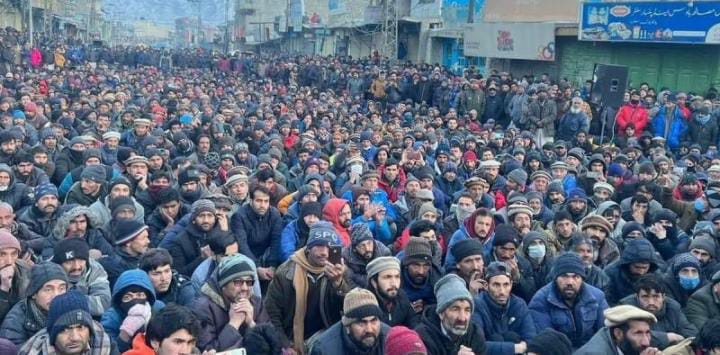Statewide Strike in Azad Kashmir: United Protest Against Presidential Ordinance
Islamabad (NNP) Azad Kashmir witnessed a complete shutter-down strike on the call of the Azad Kashmir Action Committee, as protests erupted across the region against the controversial presidential ordinance. From major cities to remote areas, business activities halted, transport was suspended, and educational institutions remained closed, reflecting widespread public opposition.
In Islamgarh, President of Anjuman Tajran, Haji Muhammad Younis, commended the traders’ unity and solidarity with the Action Committee. He reiterated the community’s commitment to defending public rights, while all markets remained closed in a show of collective resolve.
Chakswari saw a peaceful protest led by local leaders, including Haji Muhammad Wahid and Advocate Muhammad Shoaib. Demonstrators demanded the ordinance’s repeal and the immediate release of detained activists. The protest paralyzed business activities in Chakswari, Hamidabad, and Faizpur Sharif, with participants pledging to continue demonstrations until their demands are met.
In Neelam Valley, commercial centers and transportation came to a standstill, including district headquarters Athmaqam. Protesters from various sectors, including traders, transport unions, and municipal representatives, rallied against the ordinance, expressing firm support for the Joint Action Committee’s charter of demands.
Kotli saw a massive procession led by the Traders Action Committee, which marched from Hafiz Aslam Road to Shaheed Chowk. Addressing the crowd, leaders like Malik Yaqoob and Prof. Habib Malik called for the withdrawal of the ordinance and the release of activists. The protesters warned the government of intensified unrest if public grievances were ignored.
In Mirpur, the response was equally strong. Markets and shopping centers remained completely closed, and a large procession carrying black flags moved from New City to Chowk Shaheedan. Protesters raised slogans against austerity measures, including subsidy cuts on electricity and flour, and demanded immediate action to alleviate economic hardships.
The strike showcased united opposition against the ordinance, which protestors argue infringes on freedom of expression and imposes undue economic strain. Leaders warned that the public’s peaceful struggle would continue until the law is repealed and detainees are released, emphasizing that any further delay could escalate public discontent.



